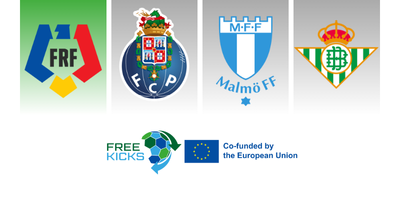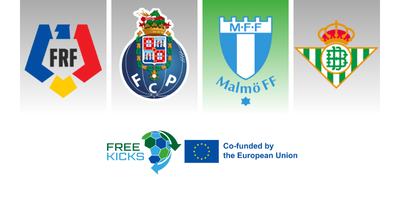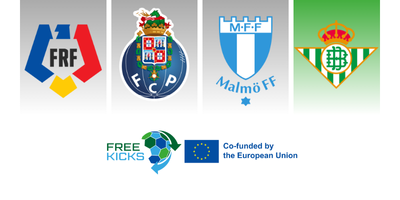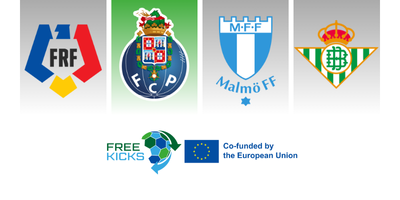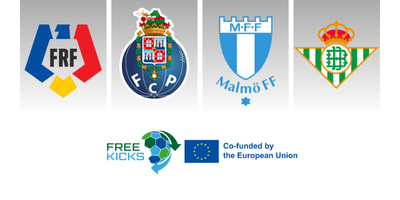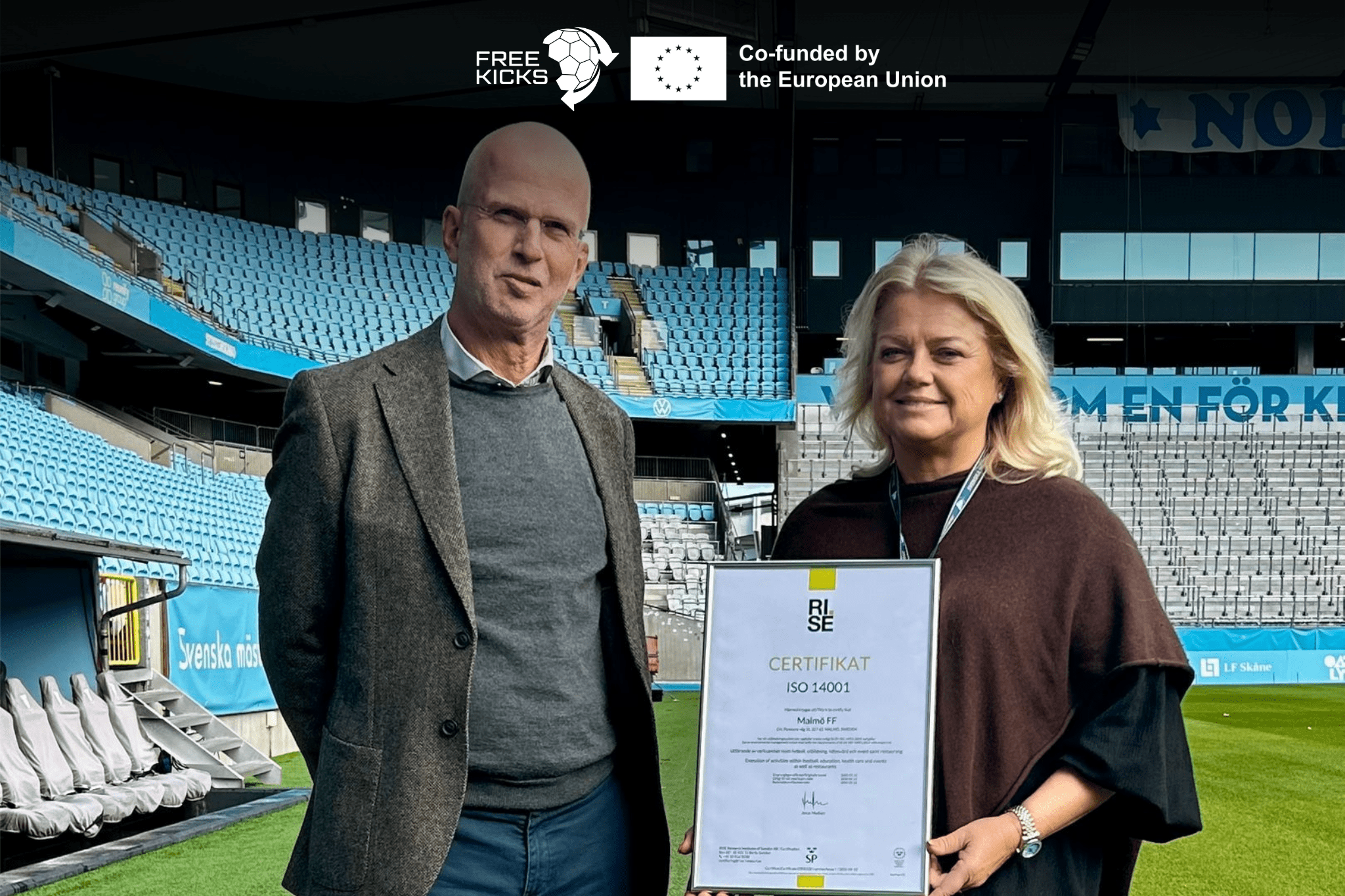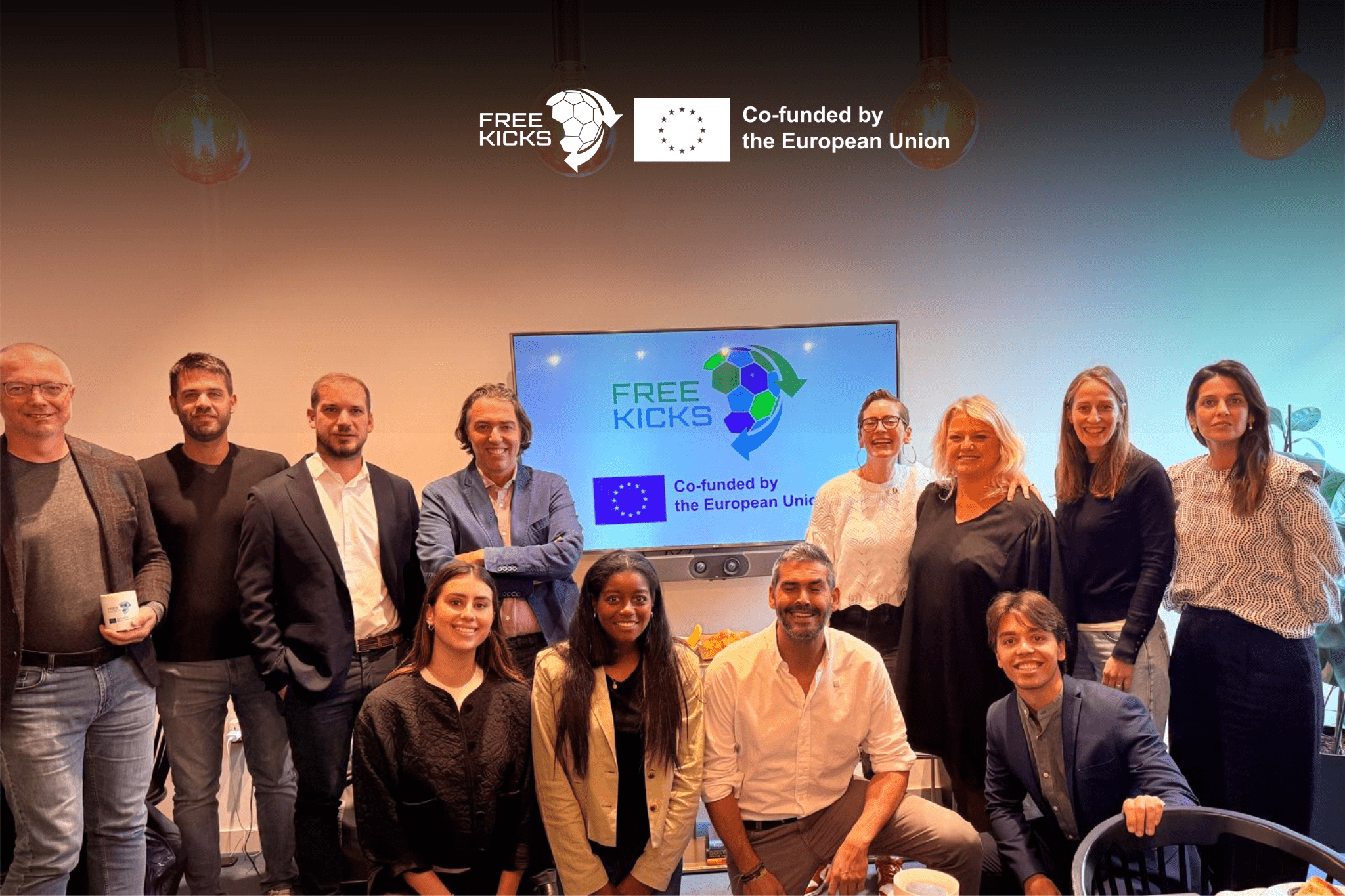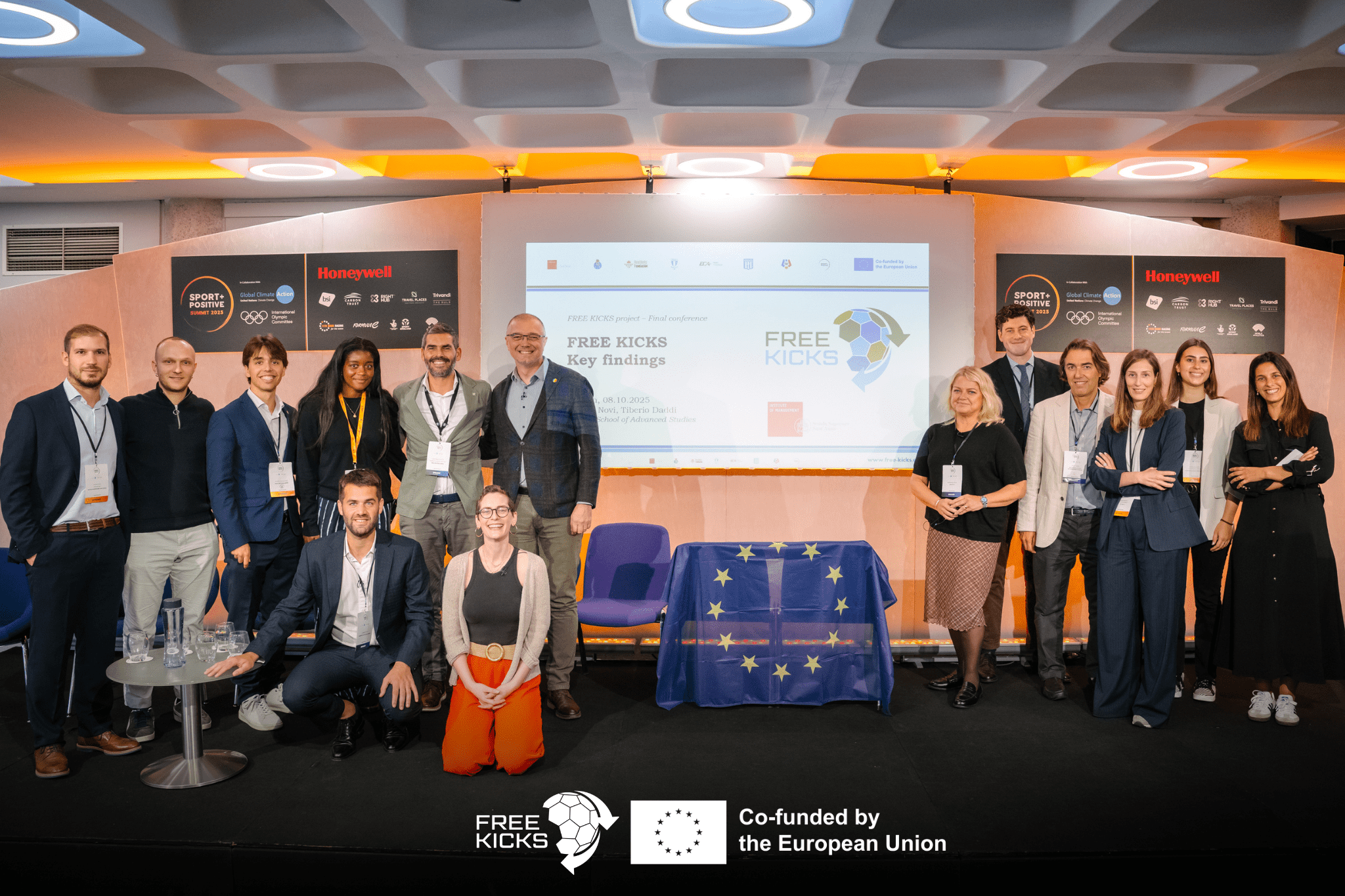EU-Funded Football and Environment Project Reaches Over Six Million People
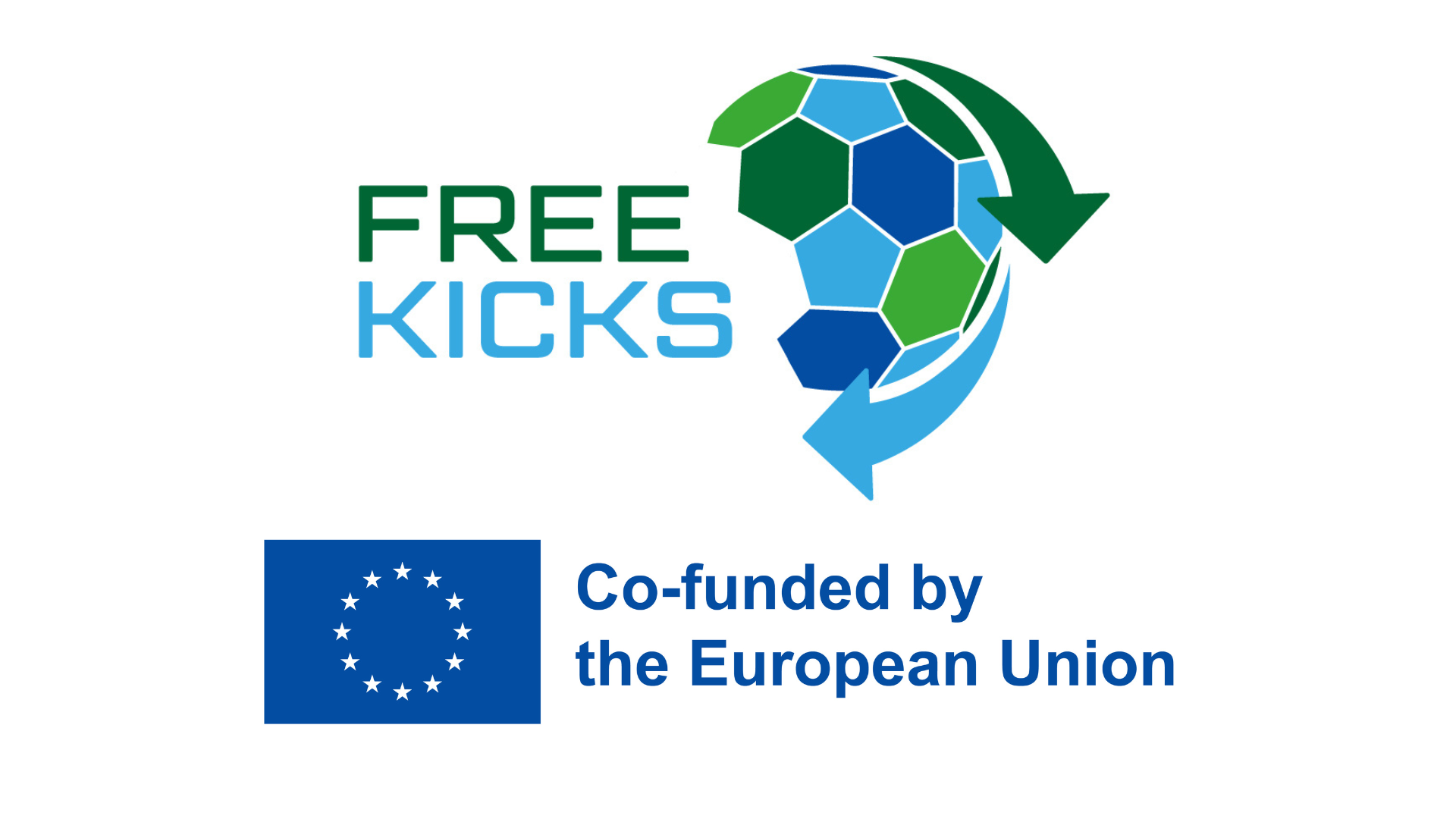
FOR IMMEDIATE RELEASE
Headline: EU-Funded Football and Environment Project Reaches Over Six Million People
13 November 2025, London, UK: The FREE KICKS* project, co-funded by the European Union, has reached over six million football fans and industry stakeholders with messaging on environmental sustainability through in-stadia and online awareness raising campaigns, events and more.
Co-ordinated by the Sant’Anna School of Advanced Studies, and in partnership with FC Porto, Fundación Real Betis Balompié Foundation, Malmö FF, Racing Club, Romanian Football Federation, European Football Clubs (EFC) and Sport Positive, the 30-month project successfully addressed the topics of circular economy and environmental sustainability in football organisations.
Over the project’s 30-month duration, FREE KICKS partners shared progress and learnings via dissemination moments including awareness raising events, a mid-term report and conference, knowledge sharing via podcasts, social media, newsletters and videos and a final report and conference detailing the findings and achievements of the project.
All recorded communication and dissemination activities with the general public and stakeholders have reached a total of 6,916,711 people.
A considerable amount of the total reach is credited to in-stadia activities that included displaying FREE KICKS information, banners, signage, and video materials during Allsvenskan, CONMEBOL Sudamericana, LALIGA, Liga Portugal Betclic, and Liga Profesional de Fútbol and UEFA International matches.
Leveraging athletes as the storytellers and influencers of our time, project partners created and posted short voxpops videos which were shared on social media. These featured internationally recognised footballers, as well as fans, speaking about or demonstrating environmentally-conscious behaviours.
In-person events with their own employees, fans and the wider football industry enabled more direct dissemination of key information. These activities alone reached over 3000 people. Each project partner held one awareness-raising event, engaging stakeholders and the local community on FREE KICKS. FC Porto celebrated its EMAS Certification Ceremony at Estádio do Dragão, the Romanian Football Federation hosted a session during the 2024 European Sports Week while Malmö FF leveraged its second Members Meeting of the Year. Racing Club collaborated with the National University of General Sarmiento in Buenos Aires, Argentina, to host an event for students. Real Betis Balompié organised two events, an awareness talk on environmental issues tailored towards young people and a water-saving installation event for scholars and staff.
Additional events further promoted the FREE KICKS project, including presentations at the ECA Club Connect meeting in Madrid, at the 2024 and 2025 editions of Sport Positive Summit, and activities at the FADDIM Futsal League event and at an informational stand in the FanZone. FC Porto also held another awards ceremony for its “Coração Verde” (Green Heart) certification.
A deliverable of the project was to calculate the environmental footprint of a single football match, through completing life cycle assessments, which four football club partners did. Solid data like this is incredibly helpful to industry progress and garnered a lot of attention online, with a combined view count and social media impression rate of over 16,000.
The project held both its mid-term and final conferences in London, at Sport Positive Summit 2024 and 2025, respectively. Sport Positive Summit, in collaboration with UNFCCC and International Olympic Committee, is the leading global Summit bringing together over 500 sports stakeholders from all over the world to support the acceleration of positive climate action and ambition, to safeguard the future of global sport. Through conference attendances, online stream views and networking, FREE KICKS reached over 1200 people.
Additional dissemination included the project website, social media, biannual newsletters, webinars and podcast episodes that were readily available to the industry and public. Football partners even included FREE KICKS in their respective sustainability reports and on their organisation’s online sustainability pages. To date, there have been over 10,000 views of the project website. On social media, over 80 dedicated posts led to 67,377+ post impressions and 2528+ active post engagements.
As the project enters its final phase, the FREE KICKS website will remain live for an additional two years, offering information, resources to the public. Reflecting on their respective achievements during the project, partners stated:
“We are happy and proud to be front runners both on and off the pitch. The three different certifications we obtained during 2024 are not a one-time target, but a commitment for the future. In just a few months it will be time for a new review. – The fact that it will be a movement and continuous learning is in line with how we have trained the entire organization, that we must constantly come back to the questions. Malmö FF should be part of the solution, not part of the problem”
– Magdalena Nour, Head of Sustainability at Malmö FF
“Through the FREE KICKS project, we have strengthened our commitment to reducing our environmental impact while engaging fans, employees, and the wider football community in meaningful climate action. Being part of a European-funded project with such dedicated partners who share this vision has been both inspiring and instrumental in accelerating sustainable change within our sport.”
– Teresa Santos, Sustainability Manager at FC Porto
“The FREE KICKS program gave us the opportunity to be part of a working group where we were able to visualise and equalise our situation, while also learning collaboratively from European examples. Without this initiative, none of this would have been possible.”
– Ramiro Pazos, external consultant to Racing Club
“By accomplishing the objectives of Free Kicks, the Romanian Football Federation consolidated its position of leadership in sustainability, in Romanian sport. As the first European sports federation to hold the EMAS Certificate we feel proud of this achievement and also thankful to our partners, for the support they gave us in the process. Free Kicks is an example of how European sports organizations can cooperate for a common goal: to make football more sustainable for the future generations.
– Florin Şari, Public Policy and Social Responsibility Manager, at Romanian Football Federation
“Progress on environmental sustainability in football, and beyond, relies on it being prioritised and resourced, alongside collaboration and genuine engagement,” said Claire Poole, CEO and Founder of Sport Positive. “FREE KICKS project partners have benefited from all of these things, and it shows when they are present, the impact multiplies. Change can happen more quickly and effectively when knowledge is shared and ambition is collective.”
– Claire Poole, CEO and Founder of Sport Positive
For press enquiries of for more information, please contact:
* Funded by the European Union. Views and opinions expressed are however those of the author(s) only and do not necessarily reflect those of the European Union or the European Education and Culture Executive Agency (EACEA). Neither the European Union nor EACEA can be held responsible for them
###
